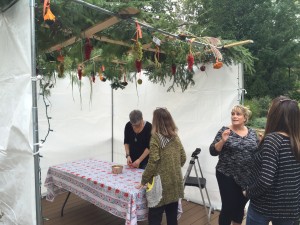The month of Elul precedes the High Holidays. We use it to prepare for these Days of Awe. It can be a magical time.
The preparation is the mental and spiritual “getting ready” so that the holidays take on deeper significance. Almost anything we do is done better if we are prepared for it. So how do we prepare?
Traditionally each day starts with the blowing of the Shofar at the conclusion of morning prayers. The awesome penetrating sound is called a “wake up call” by one of our great sages Maimonides. For those of us without ram’s horns, each day still can have moments where we weave emotions and thoughts, heart and mind, and contemplate who we are. It could be formal learning like reading a Psalm, I will share some ideas going forward. Try Psalm 27 (read it at the end of this essay) or maybe Psalms 4, 5 and 6 if you would like to follow our Hasidic friends tradition. For others a moment in front of the mirror might work.
A quiet conversation with ourselves might work better for many. Where are we in our life? Is it where we expected? What is our unfinished business and what do we need to do to complete the task? What about our personal relationships? Who do we need to forgive and, at least as important, who needs to forgive us? This introspective process during Elul leads to the “Day of Judgment.”
The Day of Judgment we know from our childhood stories is a time when the ledger book is opened up in Heaven and the Almighty determines who will live and who will die. But let me offer another interpretation:
If we are given the gift of life for another year, how will we use it? If life is truly a precious gift, how will we cherish it and make the most out of it? What can we do this year that will permit us to look back upon it and say it was time well spent?
Let’s spend the time now preparing for an awesome year to come.
Psalm 27 (JPS Translation)
The LORD is my light and my salvation; whom shall I fear? The LORD is the strength of my life; of whom shall I be afraid?
When the wicked, even mine enemies and my foes, came upon me to eat up my flesh, they stumbled and fell.
Though an host should encamp against me, my heart shall not fear: though war should rise against me, in this will I be confident.
One thing have I desired of the LORD, that will I seek after; that I may dwell in the house of the LORD all the days of my life, to behold the beauty of the LORD, and to enquire in his temple.
For in the time of trouble he shall hide me in his pavilion: in the secret of his tabernacle shall he hide me; he shall set me up upon a rock.
And now shall mine head be lifted up above mine enemies round about me: therefore will I offer in his tabernacle sacrifices of joy; I will sing, yea, I will sing praises unto the LORD.
Hear, O LORD, when I cry with my voice: have mercy also upon me, and answer me.
When thou saidst, Seek ye my face; my heart said unto thee, Thy face, LORD, will I seek.
Hide not thy face far from me; put not thy servant away in anger: thou hast been my help; leave me not, neither forsake me, O God of my salvation.
When my father and my mother forsake me, then the LORD will take me up.
Teach me thy way, O LORD, and lead me in a plain path, because of mine enemies.
Deliver me not over unto the will of mine enemies: for false witnesses are risen up against me, and such as breathe out cruelty.
I had fainted, unless I had believed to see the goodness of the LORD in the land of the living.
Wait on the LORD: be of good courage, and he shall strengthen thine heart: wait, I say, on the LORD.


